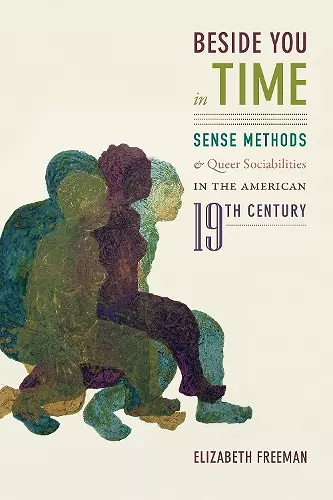Beside You in Time
Sense Methods and Queer Sociabilities in the American Nineteenth Century
Format:Hardback
Publisher:Duke University Press
Published:6th Sep '19
Currently unavailable, and unfortunately no date known when it will be back
This hardback is available in another edition too:
- Paperback£20.99(9781478006350)

In Beside You in Time Elizabeth Freeman expands biopolitical and queer theory by outlining a temporal view of the long nineteenth century. Drawing on Foucauldian notions of discipline as a regime that yoked the human body to time, Freeman shows how time became a social and sensory means by which people assembled into groups in ways that resisted disciplinary forces. She tracks temporalized bodies across many entangled regimes—religion, secularity, race, historiography, health, and sexuality—and examines how those bodies act in relation to those regimes. In analyses of the use of rhythmic dance by the Shakers; African American slave narratives; literature by Mark Twain, Pauline Hopkins, Herman Melville, and others; and how Catholic sacraments conjoined people across historical boundaries, Freeman makes the case for the body as an instrument of what she calls queer hypersociality. As a mode of being in which bodies are connected to others and their histories across and throughout time, queer hypersociality, Freeman contends, provides the means for subjugated bodies to escape disciplinary regimes of time and to create new social worlds.
“Beside You in Time is a singularly powerful meditation on the biopoliticized timing of bodies but also upon the carnal body as an instrument of sociability, a tool for fugitive world-making. Elizabeth Freeman takes discourses and scenes we thought we knew and, by locating them in a context so fresh in conception, brings them to a new dynamic life. Americanists, queer theorists, anybody interested in the state of critical theory after New Historicism: all will be eager to get hold of this field-shifting and necessary book.” -- Peter Coviello, author of * Make Yourselves Gods: Mormons and the Unfinished Business of American Secularism *
“Elizabeth Freeman's fierce femme provocation expands contemporary critical thinking about biopower, leading queer Americanist scholarship toward an exploration of the rich potentialities buried within the history of sexuality.” -- Dana Luciano, author of * Arranging Grief: Sacred Time and the Body in Nineteenth-Century America *
"This book makes an important contribution to queer theory as well as to American literary and cultural studies in the long nineteenth century, as Elizabeth Freeman frames the field." -- Daniel T. O'Hara * Review 19 *
"What I like most about Freeman’s Beside You in Time is its capacious sense of reading, along with the queer possibilities that inhere, for her, in all social encounters and interactions. The book is filled with insights on Freeman’s practice as a teacher and scholar. . . . Her close readings invite an intimate, associative interpretation that refreshes and surprises with its insights." -- Ben Bascom * American Literary History *
“Freeman’s analytical imagination is on full display…. Beside You in Time helps us think differently about how bodies connect through time, through desire, through narrative (itself a chronological technology), and, most importantly, through contact with each other. She helps us reconsider our present moment as we are physically distanced but temporally together: on our computer screens and on the streets.” -- Sarah E. Chinn * Studies in the Novel *
“Freeman is productively in conversation with cultural theorists of the last forty years, and she argues generously and generatively, adding nuance and worthy provocations.” -- Stephanie P. Browner * Modern Philology *
“Beside You in Time . . . remind[s] us of the robust synergies between religious and queer studies, while suggesting how we might better understand the field’s long-standing emphasis on nonnormativity within rather than against histories of racist and colonial exclusions.” -- Travis M. Foster * GLQ *
“When readers get into the close readings that make up the bulk of Freeman’s discussion, they will find that she is a lucid and illuminating literary interpreter.”
-- Thomas Allen * Journal of American Studies *ISBN: 9781478005049
Dimensions: unknown
Weight: 476g
240 pages